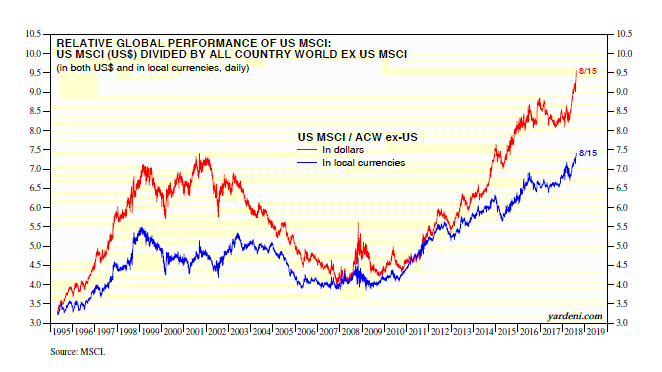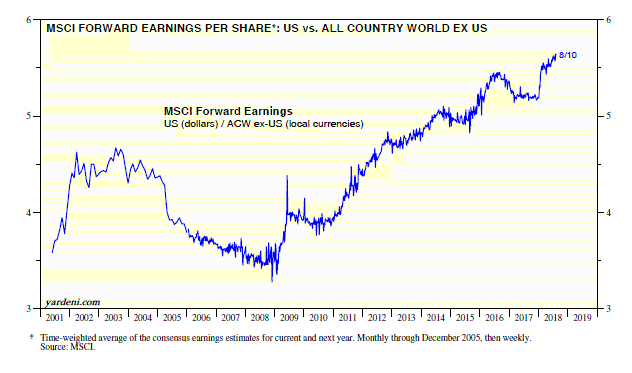
US stocks have been outperforming other major overseas stock price indexes since early February. That’s when President Donald Trump started his “America First” protectionist campaign aimed at making free trade fairer trade with America’s major trading partners. During the current bull market, I had been recommending a Stay Home investment strategy until the fall of 2016. On November 8, 2016, I switched to a Go Global strategy on mounting evidence that the global economy was rebounding from the worldwide energy-led mini-recession of 2015. I switched back to Stay Home in early June of this year in response to the escalating trade war.
US stocks have outperformed the major overseas stock indexes priced in local currencies so far this year. They’ve done even better when foreign indexes are priced in local currencies because the dollar has soared in response to Trump’s escalating trade war. Meanwhile, the 10-year US Treasury bond yield has remained below 3.00% since May 24. All this suggests that the greenback and US financial assets are viewed as the winners in a trade war.
However, Stay Home isn’t all about a risk-off approach to overseas economies. In fact, I believe that the outperformance of Stay Home so far this year also owes a lot to Trump’s stimulative tax cuts at the end of last year. The preceding statement doesn’t seem to apply to the trade-weighted dollar, which jumped 7.4% since the year’s low on February 1 (here). That coincides with the implementation of Trump’s America First trade campaign.
I have often observed that the dollar tends to be strong (or weak) when the rest of the world is looking relatively weak (strong). That explains why the dollar tends to be inversely correlated with commodity prices, as measured by the Goldman Sachs Commodity Index (GSCI) (here). So far this year, the GSCI is holding up reasonably well. However, it is heavily weighted with the prices of petroleum products, which have been propped up by looming US sanctions on Iranian crude oil.
Looking somewhat weaker is the CRB raw industrials spot price index, which has been weighed down by a significant drop in the price of copper in recent weeks. The price of copper remains highly and inversely correlated with the value of the dollar (here and here).
Of course, some of the relative weakness in the rest of the world reflects the relative strength provided the US economy by Trump’s tax cuts. In other words, the dollar’s strength isn’t all about the trade war. Fed officials continue to say that while the trade war may be a threat to US economic growth, they believe the economy will remain strong enough to justify further hikes in the federal funds rate from 1.75%-2.00% currently to possibly 2.75%-3.00% next year. Meanwhile, both the ECB and BOJ show no signs of normalizing their official interest rates, which remain abnormally low just below zero (here).
The main reason why Stay Home has been outperforming Go Global since the start of the bull market is that the forward earnings (i.e., the time-weighted average of consensus estimates for this year and next year) of the US MSCI stock price index has outpaced the forward earnings of the MSCI All Country World ex-US Index (in local currencies). The former is up 172% since it bottomed during the 4/30 week of 2009 through the 8/2 week this year, while the latter is up 78% over the same period (here and below).

